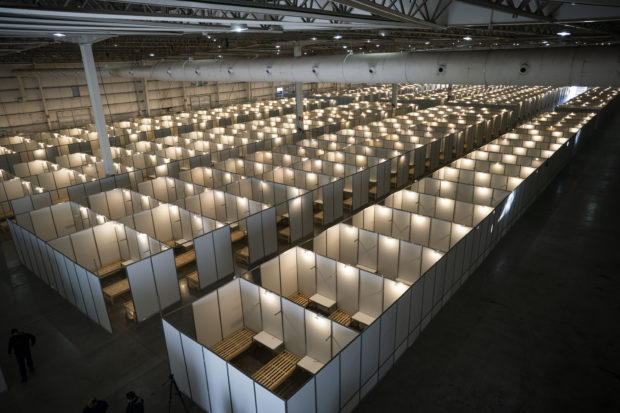BUENOS AIRES, Argentina — In Argentina’s capital, authorities closed a bar after customers were seen drinking beer on the sidewalk in violation of pandemic lockdown measures. Some Buenos Aires stores flouted a ban to stay shut, saying online sales are inadequate.

FILE – In this April 17, 2020 file photo, cots fill Tecnopolis Park where asymptomatic COVID-19 patients are encouraged with money to quarantine for 10 days in Buenos Aires, Argentina. People are on edge in Argentina, where the number of new coronavirus cases is surging despite nearly five months of strict limits on movement and activities in Buenos Aires and the surrounding area. (AP Photo/Victor R. Caivano, File)
Tired of months of quarantine, an Olympic rower broke the rules and trained alone on a river. He cried with joy and a sense of release once back on the water.
People are on edge in Argentina, where the number of new coronavirus cases is surging despite nearly five months of strict limits on movement and activities in the Buenos Aires area, home to about two-thirds of the country’s population. Argentina was struggling economically long before the pandemic; isolation measures deepened the pain.
The health crisis has an increasingly political tinge, as the government blames the surge on lockdown breaches and the opposition says basic freedoms are in peril.
As the rival camps argue, the virus spreads.
With more than 260,000 confirmed coronavirus cases, Argentina is among the top 10 countries contributing the most new cases to the global tally since July 22, according to Johns Hopkins data through Monday. The Latin American country of 45 million people has reported about 5,000 deaths from COVID-19, a relatively low number compared to other countries with similarly high infection rates.
Latin American countries account for some of the highest confirmed case numbers and death tolls from the coronavirus in the world, and the pandemic continues to sweep the region.
“We are seeing disturbing increases in places that had previously managed to contain epidemics, such as Colombia and Argentina,” Carissa Etienne, director of the Pan American Health Organization, said Tuesday.
Another senior official in the organization, Sylvain Aldighieri, said that while most cases in Argentina had been reported in Buenos Aires province, the coronavirus appeared to be spreading in less populated regions in recent weeks. For example, there was an outbreak in the remote Argentine province of Jujuy, on the border with Chile and Bolivia, after the lockdown there was eased.
Argentine President Alberto Fernández said Tuesday that the country is enduring the “worst moment” of the pandemic and he attributed the escalating spread of the coronavirus to people who ignored isolation measures.
“The freedom of the people is not in dispute, but the first condition of being free is to be alive,” Fernández said in an interview with Futurock radio.
Last week, the government decreed that people could not host social gatherings at home. The measure, in effect until at least Aug. 16, set off debate about whether civil liberties were under threat. In theory, violators could face up to two years in prison, though there is speculation that authorities are trying to merely alarm people into obedience because the measure appears extremely difficult to enforce.
Despite the crackdown, there are near-daily reports of young people holding parties, barbecues or games of soccer. A study released this month by the psychology department of the University of Buenos Aires noted increases in the number of people consuming alcohol and stress medication during the pandemic, and a sharp decrease in healthy activities such as physical exercise.
Wearing the national colors, blue and white, Olympic rower Ariel Suárez trained this week in the Luján river in Tigre, north of Buenos Aires, for the first time in months. Suárez, who said it was absurd for Argentina to let some athletes, including soccer players, prepare to resume practice while he is barred from training, has yet to face any punitive action.
Dr. Gustavo Lopardo, an infectious diseases expert and a member of a panel advising Fernández on the pandemic response, said Argentina’s health system has made a lot of the right moves. Hospital beds are available and medical workers are more experienced and protected after fighting the coronavirus for months, he said.
Lopardo acknowledged, though, that it was hard to get the entire population to go along with the strict lockdown.
“We Argentines like to get together to eat and drink,” he said.